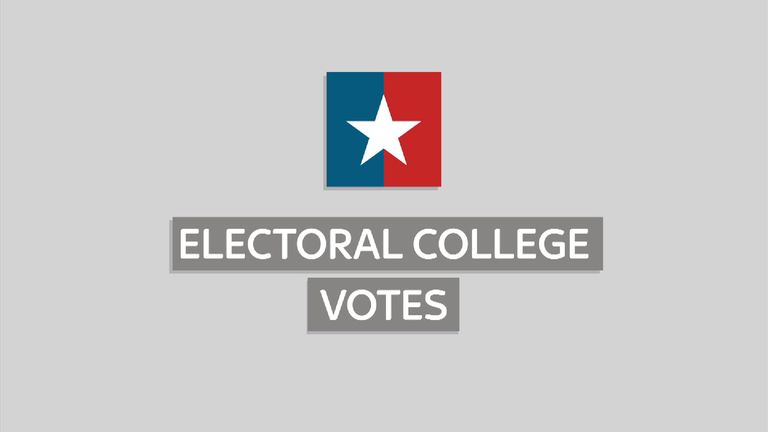Bid to end Electoral College as Trump lags behind in popular vote
A Democratic senator says the system is undemocratic and files a bill to abolish it, while the President-elect calls it "genius".
Thursday 17 November 2016 16:16, UK
A Democratic senator has introduced legislation that would scrap the Electoral College after Donald Trump lost the popular vote but won the presidency.
Outgoing California senator Barbara Boxer, one of the Senate's most forceful liberal voices, said the system is not democratic.
"This is the only office in the land where you can get more votes and still lose the presidency," said the senator, who did not seek re-election.
"The Electoral College is an outdated, undemocratic system that does not reflect our modern society, and it needs to change immediately.
"Every American should be guaranteed that their vote counts."
Democrats have seized on Hillary Clinton's lead in the popular vote to downplay Mr Trump's mandate - to little effect. Ms Boxer's proposal is unlikely to bring about a change in the system.
With more than 130 million votes counted, Ms Clinton is ahead by more than 1 million votes.
That margin is likely to increase as many of the roughly four million votes that are estimated to be left to be counted are in California, a blue state.
But Mr Trump won the vote that matters - the Electoral College. Under this system, candidates are awarded a certain number of votes for winning each state, with a total of 270 necessary to clinch victory.
Mr Trump has 290 Electoral College votes to Mrs Clinton's 232, with Michigan still undecided.
The President-elect, who in 2012 blasted the Electoral College as a "disaster for our democracy", appears to have changed his mind in the wake of his victory.
"The Electoral College is actually genius in that it brings all states, including the smaller ones, into play. Campaigning is much different!" Mr Trump tweeted.
Mr Trump, , said he would have won anyway.
"If the election were based on total popular vote I would have campaigned in NY Florida and California and won even bigger and more easily," he tweeted.
Over the decades there have been hundreds of attempts to change the Electoral College, including countless efforts in Congress.
The latest push came after Al Gore won the popular vote but lost the presidency to George W Bush in 2000.
The Democrats have won the presidency four times in the last seven elections, including this year's. Of the three they lost, they won the popular vote twice.
None of the previous attempts to change the Electoral College has had any success - and, with Republicans controlling both the House and Senate, they are unlikely to go anywhere this time.
Furthermore, the Electoral College system is enshrined in the US Constitution and any change would require qualified majorities and the ratification of many states.
One petition, on change.org, calls on the electors in the Electoral College to discard the way their states voted and cast ballots for Mrs Clinton.
"Hillary won the popular vote. The only reason Trump 'won' is because of the Electoral College," says the petition.
"But the Electoral College can actually give the White House to either candidate. So why not use this most undemocratic of our institutions to ensure a democratic result?"
Under the Electoral College system, each state gets one vote for each member of Congress representing the state. There are 538 electors.
In theory, there is no constitutional provision or federal law requiring the electors to vote according to the results of the popular vote.
But there can be fines, and in practice there have been very few cases in the country's 238-year history of electors voting against their pledge.






